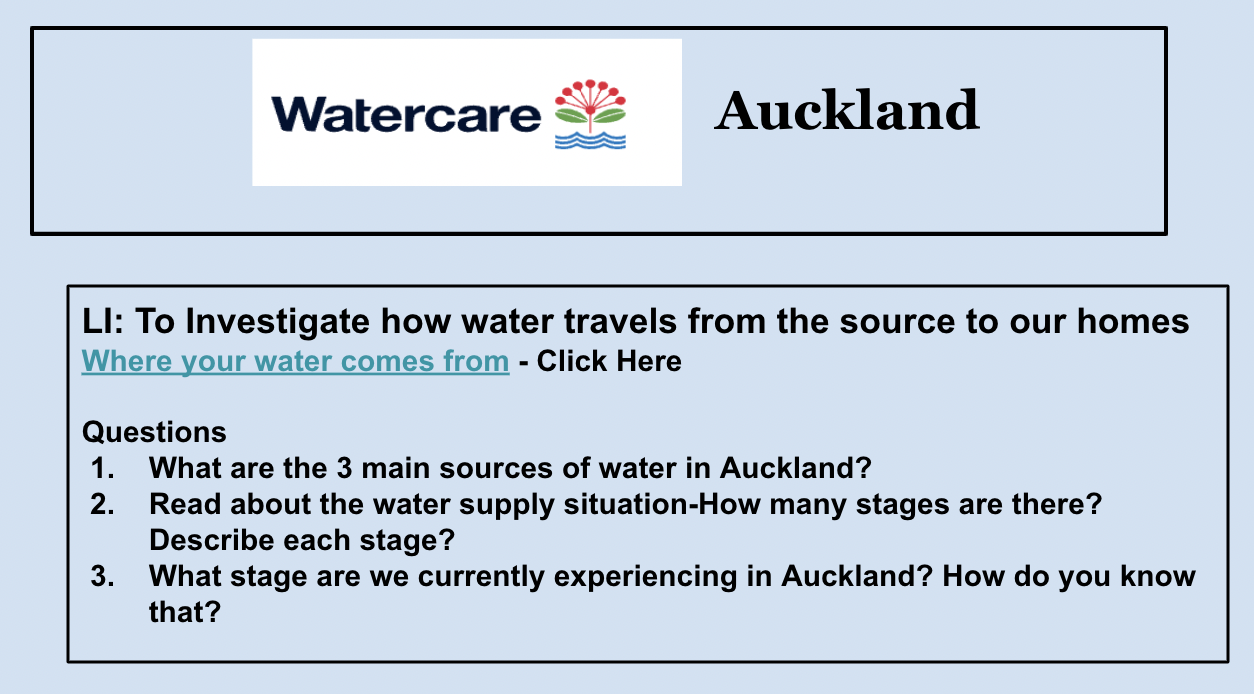7C2 Science
Section outline
-
EXPLORE / TŪHURA learning intentions:
- We are EXPLORING...the context ‘our way and us’ by discovering ecology in our school and country.
Kia ora...
Success Criteria: I can/have...
-
I can classify things as living or nonliving.
- I can describe what an environment is.
Activities:
-
Introduction to Education Perfect. How to log in and how to use it.
-
EP lesson - Living and Nonliving things.
-
Living vs Nonliving notes.
-
EP lesson - Environments.
-
Environment notes.
-
Title page.
Homework:
Up to date on all EP lessons and notes.
-
EXPLORE / TŪHURA learning intentions:
- We are EXPLORING...the context ‘our way and us’ by discovering ecology in our school and country.
- We are EXPLORING...the context ‘our way and us’ by experimenting using the scientific method and how we work together during investigations.
Kia ora...
Success Criteria: I can/have...
- Find out what ecology is.
- Describe what a NZ forest ecosystem looks like.
- Explain how NZ was formed.
- Outline the scientific method and provide an example of it when doing an experiment.
Activities:
- Slideshow in class.
- EP lesson - Land of the long white cloud.
- NZ ecosystem drawing, before and after learning about NZ species.
- Brainpop - the scientific method.
- Brainstorm when the scientific method has been used and prepare experiment for next lab.
Homework:
Title page + EP & notes up to date.
-
EXPLORE / TŪHURA learning intentions:
- We are EXPLORING...the context ‘our way and us’ by discovering ecology in our school and country.
Kia ora...
Success Criteria: I can/have...
- Define and describe the terms "native" and "introduced".
- Compare and contrast native and introduced species.
Activities:
- 'Native' and 'Introduced' brainstorm and poster.
- Peer marking posters.
- Observe sparrow vs fantail.
Homework:
Brain pop on scientific method.
-
EXPLORE / TŪHURA learning intentions:
- We are EXPLORING...the context ‘our way and us’ by discovering ecology in our school and country.
- We are EXPLORING ...the context ‘our way and us’ by experimenting using the scientific method and how we work together during investigations.
Kia ora...
Success Criteria: I can/have...
- Explain the concept of classification and apply it to different examples.
- Use the scientific method to carry out a basic investigation.
Activities:
- EP - Y7 Introduction to Classification.
- Edpuzzle - Classification.
- Classify Me! Slideshow in class.
- LAB - Dissolving solids.
Homework:
Title page + Brain pop + edpuzzle.
-
EXPLORE / TŪHURA learning intentions:
- We are EXPLORING...the context ‘our way and us’ by discovering ecology in our school and country.
Kia ora...
Success Criteria: I can/have...
- Explain the concept of classification and apply it to different examples.
Activities:
- Overdue EP and Edpuzzle.
- Classify Me! Slideshow in class.
Homework:
Catch up on ALL homework.
-
FOCUS / ARONGA learning intentions:
- We are FOCUSING...on the context ‘our way and us’ by identifying how Aotearoa’s flora and fauna adapted to the country’s unique ecology.
Kia ora...
Success Criteria: I can/have...
- Describe what an adaptation is.
- Identify how different species adapt to living in different environments.
- Infer types of adaptations using NZ bird examples.
Activities:
- Notes on overcoming challenges in a certain environment.
- Adaptations EP.
- NZ bird adaptation task in class.
Homework:
EP up to date.
-
PLAN & DO / WHAKAMAHI learning intentions:
- We are PLANNING to construct a food web so that we can understand interactions within the ecology of Aotearoa and how humans might impact these.
Kia ora...
Success Criteria: I can/have...
- Explain the concepts of predator, prey, and competition.
- Discuss how matter is recycled through different groups of organisms - producers, consumers, and decomposers.
- Build a food web to demonstrate our understanding of ecological relationships within the NZ forest.
Activities:
- Notes from slideshow in class.
- EP - food chains and food webs.
- Food web game on brainpop.
- Build a NZ forest food web as a class.
- Food web blookets.
Homework:
All notes and EP up to date. Starting to think about Science Fair.
-
PLAN & DO / WHAKAMAHI learning intentions:
- We are PLANNING to construct a food web so that we can understand interactions within the ecology of Aotearoa and how humans might impact these.
Kia ora...
Success Criteria: I can/have...
- Build a food web to demonstrate our understanding of ecological relationships within the NZ forest.
- Start to think about science fair groups and investigations.
Activities:
- NZ forest food web in groups.
- Food web blookets.
- Introduction to science fair
- Confirm science fair groups and investigations.
Homework:
All notes and EP up to date. Starting to think about Science Fair.
-
EXPLORE / TŪHURA learning intentions:
- We are EXPLORING...the context ‘develop, do, change’ by investigating a research question to collect data and recognise how it can be applied to the “real world”.
Kia ora...
Success Criteria: I can/have...
- Discuss the relevance of my scientific investigation in the introduction of my project.
- Recognise the aim of my science fair project.
- Construct a hypothesis to explain my science fair investigation.
Activities:
- Science fair slides created and week one log written.
- Learn about the parts of a scientific report introduction and write own on science fair slides.
- Write aim of investigation.
- Identify components of a hypothesis and write own.
Homework:
All science fair slides up to date with the introduction and aim needing to be finished by end of FFR.
-
FOCUS / ARONGA learning intentions:
- We are FOCUSING...on the context ‘develop, do, change’’ by identifying how to test a research question and describing the data gathered.
Kia ora...
Success Criteria: I can/have...
- Identify the equipment needed to test my hypothesis.
- Discuss the importance of fair testing and examine how the control, apparatus, and variables can modify an experimental outcome.
- Describe the steps needing to be followed to test my science fair investigation.
Activities:
- EP - Fair testing.
- EP - Reliability, repeatability, accuracy.
- Write method for science fair.
Homework:
All science fair slides up to date.
-
PLAN & DO / WHAKAMAHI learning intentions:
- We are PLANNING to apply our method so that we can gather data to investigate our research question.
Kia ora...
Success Criteria: I can/have...
- Test my science fair investigation and apply changes to improve my method if needed.
Activities:
- Following method to test science fair and gather results.
- EP - Introduction to Forces.
- Assessment submitted.
Homework:
Submit assessment and continue to collect data.
-
PLAN & DO / WHAKAMAHI learning intentions:
- We are PLANNING to apply our method so that we can gather data to investigate our research question.
- We are EXPLORING the context ‘develop, do, change’ by experimenting with different everyday examples of physical phenomena to understand the boundaries of our physical world.
Kia ora...
Success Criteria: I can/have...
- Test my science fair investigation and apply changes to improve my method if needed.
- Describe what forces are and how they act on an object.
- Apply our knowledge of forces to a password puzzle.
Activities:
- Continue testing to gather data for science fair.
- EP - Introduction to Forces + Forces Task 2.
- Brainpop - Forces.
- Forces and Speed password puzzle.
- Young Kiwi Challenger Series Science Yr 7-8.
- LAB - Balloon Car Challenge.
Homework:
Ensure all EP and brainpop are completed + turn in any overdue assignments.
-
PLAN & DO / WHAKAMAHI learning intentions:
- We are PLANNING to apply our method so that we can gather data to investigate our research question.
- We are EXPLORING the context ‘develop, do, change’ by experimenting with different everyday examples of physical phenomena to understand the boundaries of our physical world.
Kia ora...
Success Criteria: I can/have...
- Test my science fair investigation and apply changes to improve my method if needed.
- Design a balloon car to show how our knowledge of forces can create motion.
- Critique our balloon car designs to understand how they might have travelled further or more smoothly.
- Revise our knowledge of forces and motion.
Activities:
- Continue testing to gather data for science fair.
- Balloon Car Challenge - on google classrom.
- Balloon car challenge follow up - on google classroom.
- EP - Forces and Motion revision assessment.
Homework:
Ensure all science fair testing is done and graphs are being constructed for the maths assessment.
-
Morena Year 7 Students,
My name is Mrs Naidoo and I will be teaching you Science for this term. I look forward to teaching and learning with you.
Our Topic for this term focuses on Planet Earth - Resources.
Week 1
Learning Intention :We are exploring our actions in the environment by investigating water resources.
Success Criteria
I can:
Compare rainfall in different parts of NZ and plot the results in a graph.
State and illustrate each part of the water cycle.
Describe each stage with examples.
Conduct an experiment and explain the results.
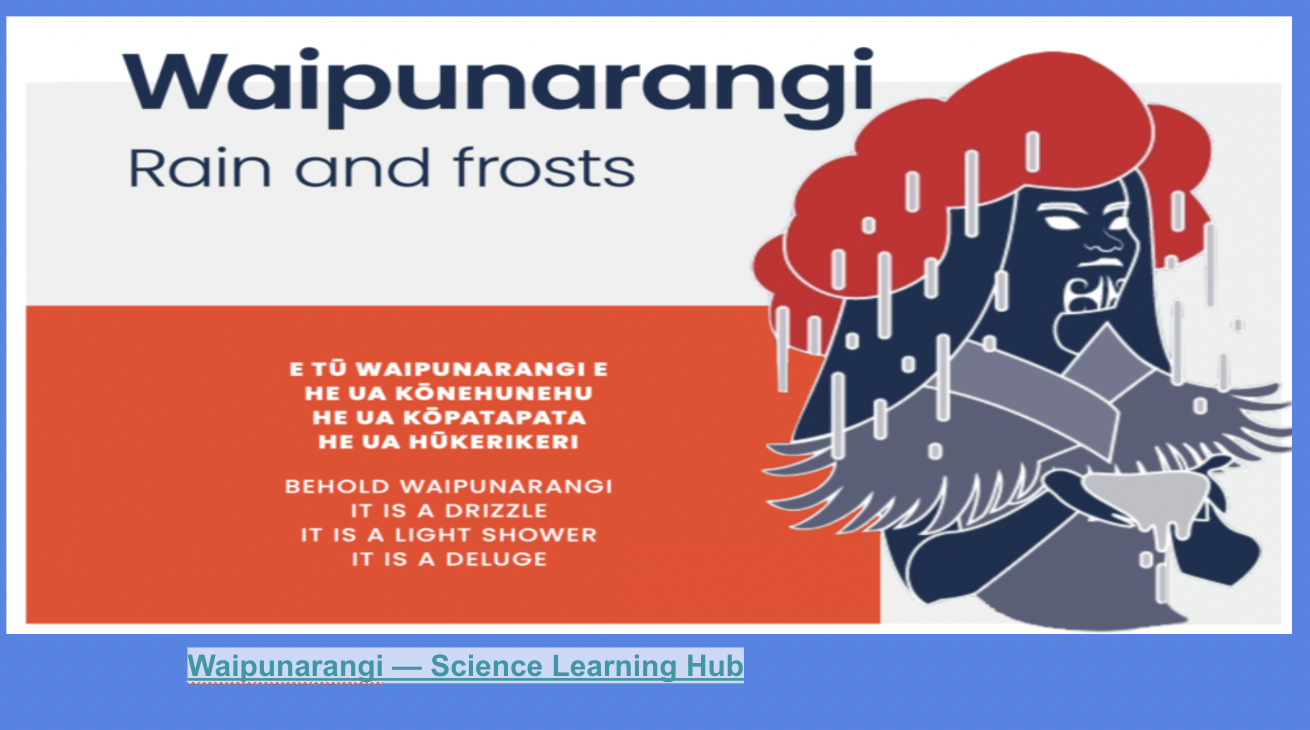
-
Our Topic for this term focuses on Planet Earth - Resources.
Week 2
Learning Intention :We are exploring our actions in the environment by investigating water resources.
Success Criteria
I can:
State and illustrate each part of the water cycle.
Describe each stage with examples.
Conduct an experiment and explain the results.
Activities
1. Quiz - The Water Cycle
2. Precipitation Experiment.
3. Draw and label the processes of the water cycle.
4. Definitions - explain new science terminology.
-
Week 3 - Planet Earth-Resources
Learning Intention
We are focusing on the context “our actions can unite or divide communities” by identifying and explaining the processes involved in the supply of water.
Success Criteria
I can:
Name the stages in the water purification process.
Compare and contrast the water supply levels in the Auckland dams.
Identify the main sources of water.
Describe the benefits of water storage.
Predict and outcome and justify my answer with evidence
-
Week 4 - Planet Earth-Resources
Learning Intention
We are focusing on the context “our actions can unite or divide communities” by identifying and explaining the processes involved in the supply of water.
Success Criteria
I can:
Name the stages in the water purification process.
Compare and contrast the water supply levels in the Auckland dams.
Identify the main sources of water.
Describe the benefits of water storage.
Predict and outcome and justify my answer with evidence

-
Week 5 - Planet Earth-Resources
Learning Intention
We are focusing on the context of “our actions can unite or divide communities” by comparing the effects of climate change on the environment (droughts/floods).
Success Criteria
I can:
Identify the causes of global warming.
Explain why climate change is not good for the Earth.
Explain how to prevent climate change.
Describe the climatic conditions in the North and South island.
-
Week 6 - Planet Earth-Resources
Learning Intention
We are focusing on the context of “our actions can unite or divide communities” by comparing the effects of climate change on the environment (droughts/floods).
Success Criteria
I can:
Identify the causes of global warming.
Explain why climate change is not good for the Earth.
Explain how to prevent climate change.
Describe the climatic conditions in the North and South island.
-
Week 7 - Planet Earth-Resources
Learning Intention
We are focusing on the context of “our actions can unite or divide communities” by comparing the effects of climate change on the environment (droughts/floods).
Success Criteria
I can:
Explain how to prevent climate change.
Describe the climatic conditions in the North and South island.
Make conclusions based on evidence.-Climate change comparative experiment.
Investigate Floods in NZ
-
PLAN & DO / WHAKAMAHI learning intentions:
- We are PLANNING demonstrate our understanding of the water cycle and environmental impacts by designing a poster and publishing a write up of the impacts in our science assessment.
I am an active learner as I know what I need to learn, where I am with that learning and what my next learning steps are:
- Emerging:
- I know what I am learning and why
- I can use evidence to identify where I am with my learning
- I can use evidence to identify my next learning steps
- Growing:
- I can describe what I am learning and why, using our shared language for learning; GREAT Ako
- I can use evidence to describe where I am with my learning
- I can use evidence to plan and take my next learning steps
-
PLAN & DO / WHAKAMAHI learning intentions:
- We are PLANNING...to apply our knowledge of water. by justifying our actions on this resource.
Term 3 Week 9
Success Criteria: I can/have...
Design a poster to state the impacts of droughts and floods.
Create a safety/ evacuation plan for my whanau in case a flood occurs.
Perform a scientific investigation to understand the changing states of water.
- We are PLANNING...to apply our knowledge of water. by justifying our actions on this resource.
-
School Holidays
-
School Holidays
-
EXPLORE / TŪHURA learning intentions:
- We are EXPLORING...the context of 'change and adaptations' by identifying the various forms of Energy that exist.
- Kia ora...
Success Criteria: I can
Explain what energy is.
Identify the properties of energy.
Name the various types of energy.
Compare and contrast potential and kinetic energy and give examples.
Activities: Google Classroom - Link to Activities
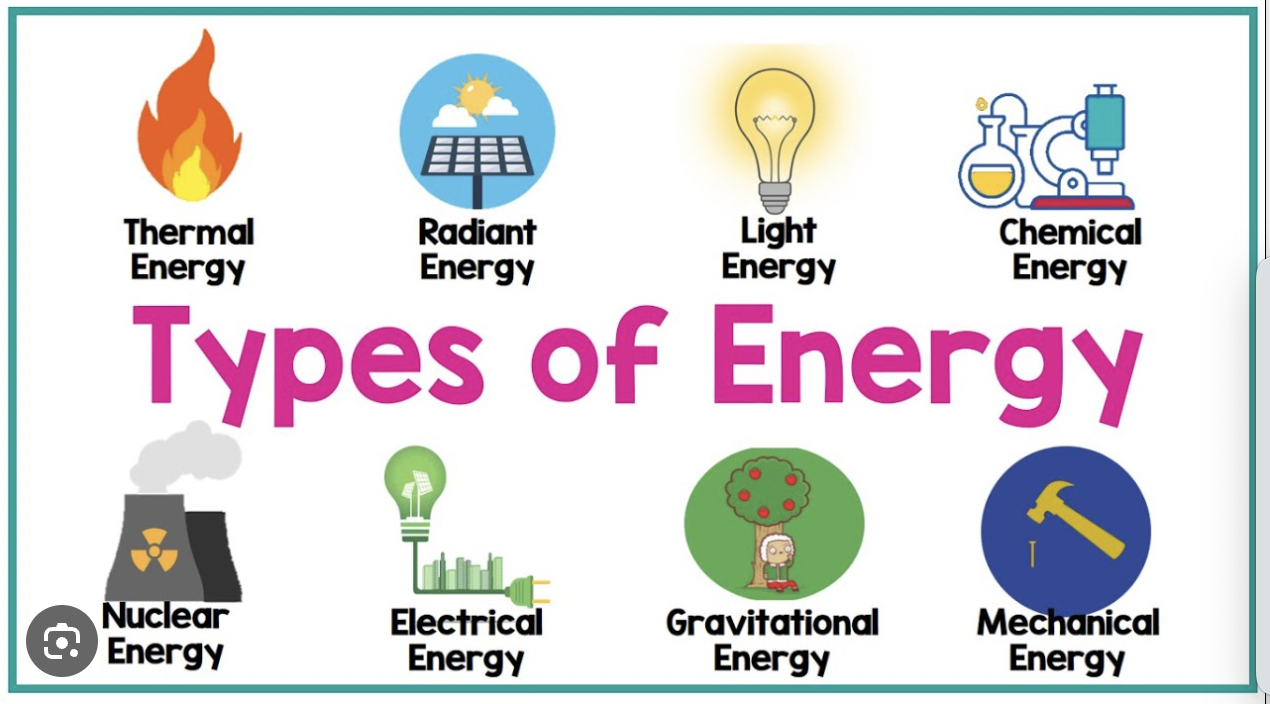
- We are EXPLORING...the context of 'change and adaptations' by identifying the various forms of Energy that exist.
-
EXPLORE / TŪHURA learning intentions:
- We are EXPLORING...the context of 'change and adaptations' by identifying the various forms of Energy that exist.
- Kia ora...
Success Criteria: I can
Identify how energy is converted from one form to another.
Compare and contrast potential and kinetic energy and give examples.
Investigate energy sources and usage in New Zealand
- We are EXPLORING...the context of 'change and adaptations' by identifying the various forms of Energy that exist.
-
Kia Ora..
FOCUS / ARONGA learning intentions:
- We are FOCUSING...on the context ‘ our choices affect our outcomes’ by investigating how energy is transferred in various situations.
Success Criteria: I can/have...
Examine energy transformations in the Lab.
Describe the steps needed to conduct the investigations and record results.
Compare and explain what energy is transferred in each investigation.
Activities-Link to Google Classroom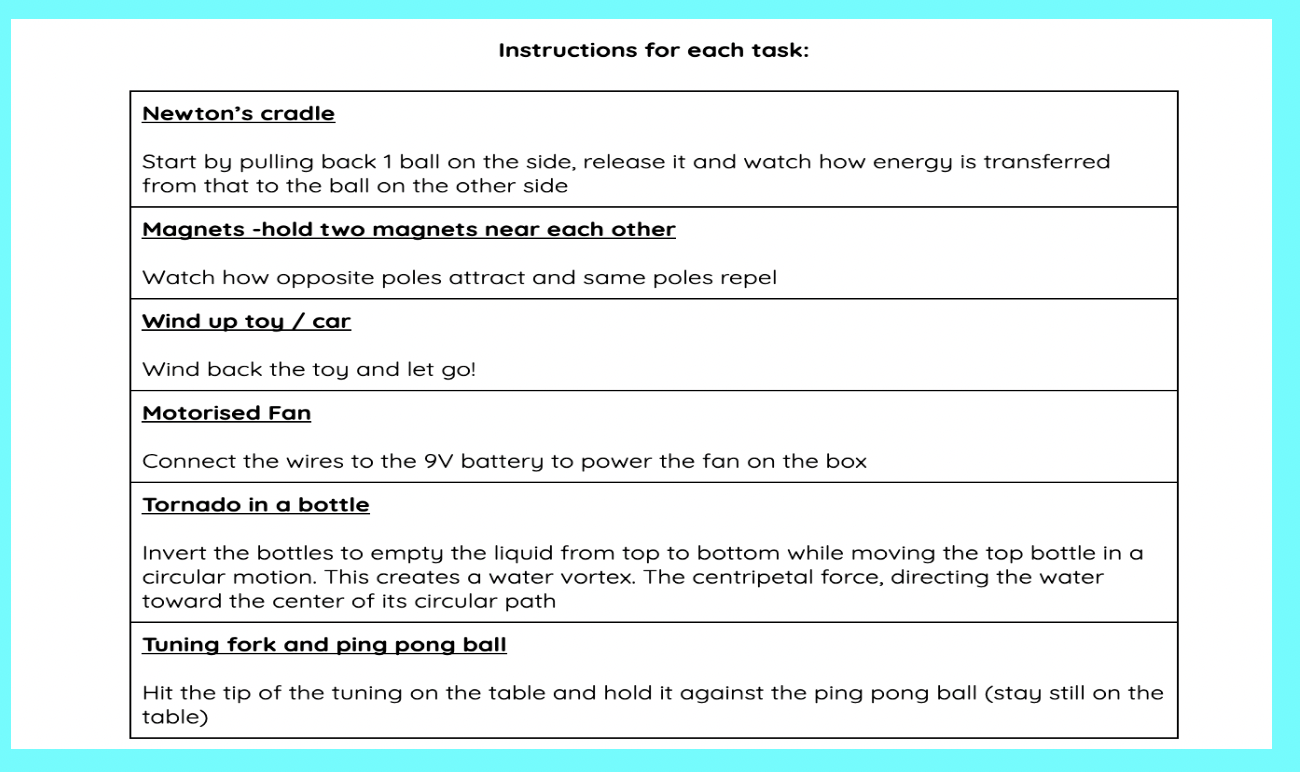
-
Kia Ora..
FOCUS / ARONGA learning intentions:
- We are FOCUSING...on the context ‘ our choices affect our outcomes’ by investigating how energy is transferred in various situations.
Success Criteria: I can/have...
Examine energy transformations in the Lab.
Describe the steps needed to conduct the investigations and record results.
Compare and explain what energy is transferred in each investigation.
Identify sources of heat energy and explain how the transfer occurs(conduction/convection/radiation
Activities-Link to Google Classroom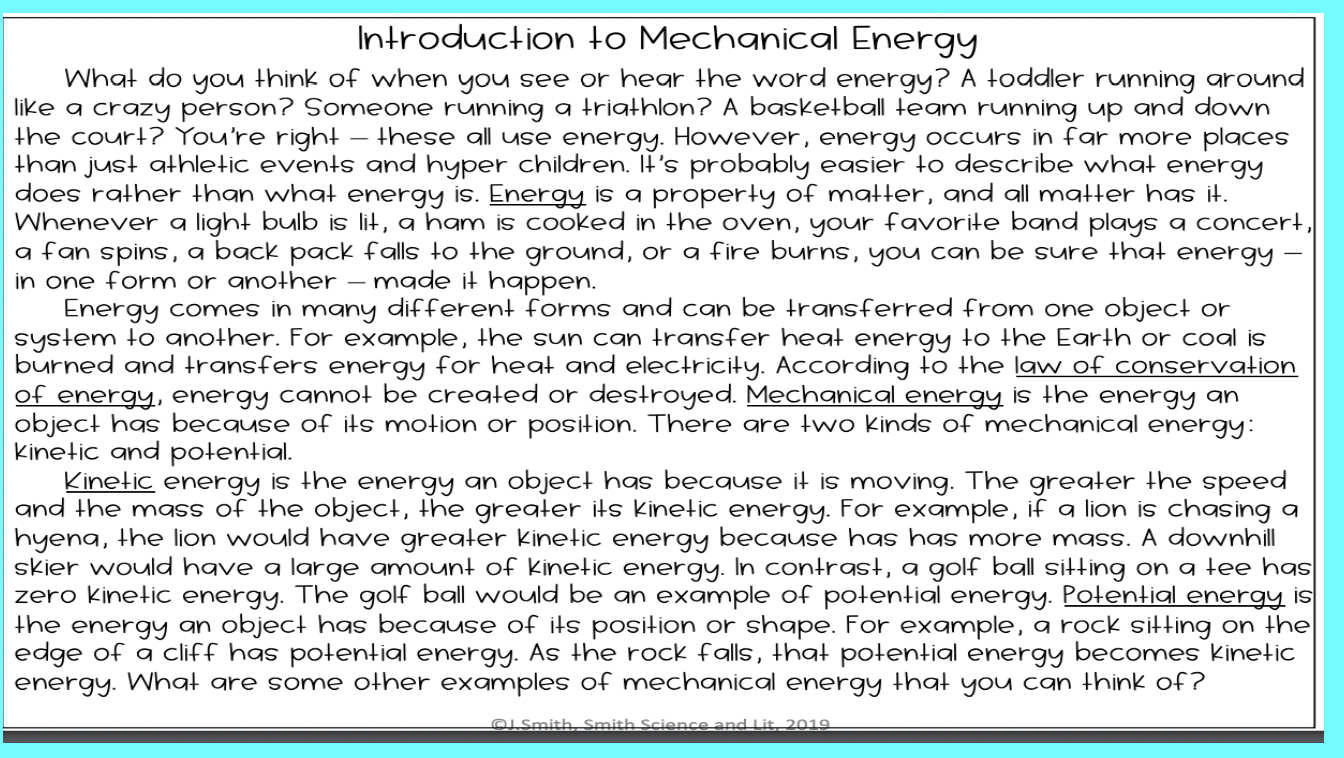
-
PLAN & DO / WHAKAMAHI learning intentions:
- We are PLANNING.. to construct a Bar Graph showing how being energy efficient can have a positive impact on the environment.
Identify sources of heat energy and explain how the transfer occurs(conduction/convection/radiation)
Construct a Bar Graph to show energy efficiencies.
Categorise the use/sources of energy according to the least/most efficient.
Draw energy trains from the source to the output.
Activities-Link to Google Classroom

-
EXPLORE / TŪHURA learning intentions:
- We are EXPLORING...the context of 'choices and their impacts' by identifying the different types of forces and the effects created.
- Kia ora...
Success Criteria: I can
Name the different effects that forces can have.
Illustrate the direction of the force, using arrows.
Give examples of everyday scenarios where forces are in action.
Demonstrate forces at work in a scientific diagram.
Google Classroom - Link to Activities
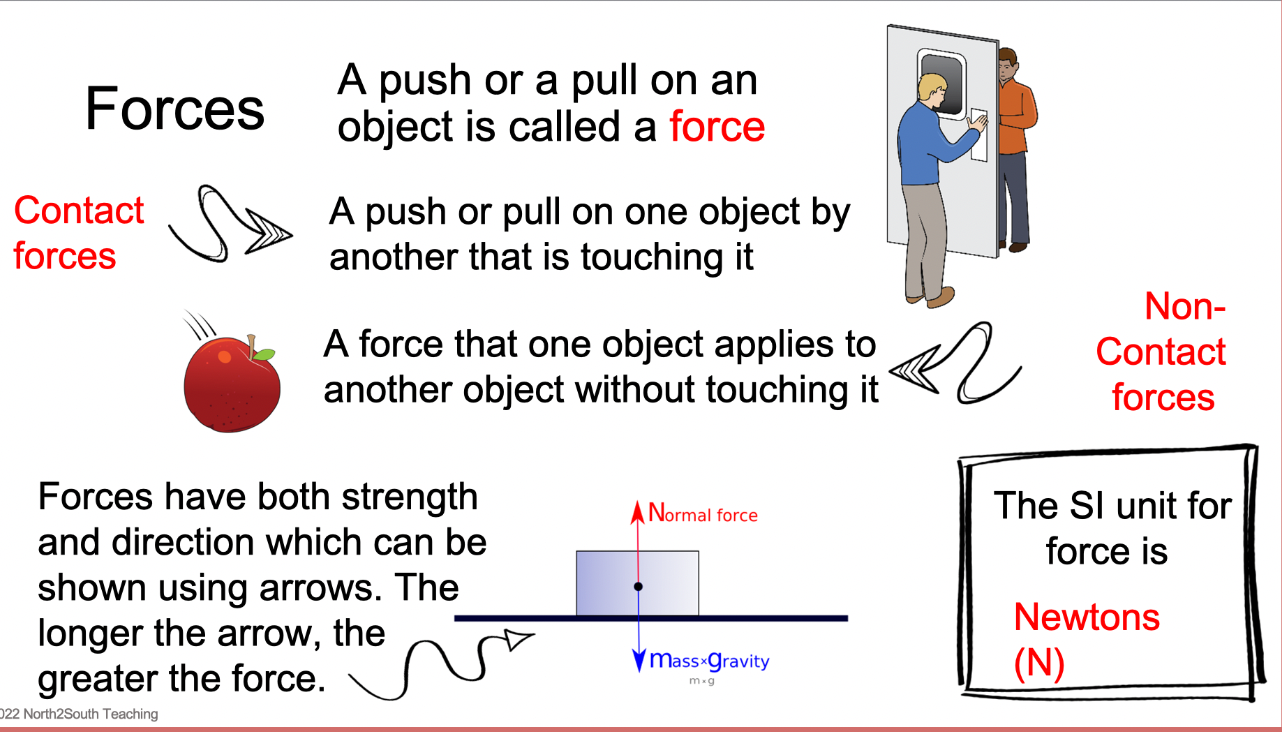
- We are EXPLORING...the context of 'choices and their impacts' by identifying the different types of forces and the effects created.
-
Kia Ora, Welcome to week 7
EXPLORE / TŪHURA learning intentions:
- We are EXPLORING...the context of 'choices and their impacts' by identifying the different types of forces and the effects created.
Success Criteria: I can
Conduct scientific investigations and record results - Forces.
Illustrate the direction of the force, using arrows.
Give examples of everyday scenarios where forces are in action.
Demonstrate forces at work in a scientific diagram.
Google Classroom - Link to Activities
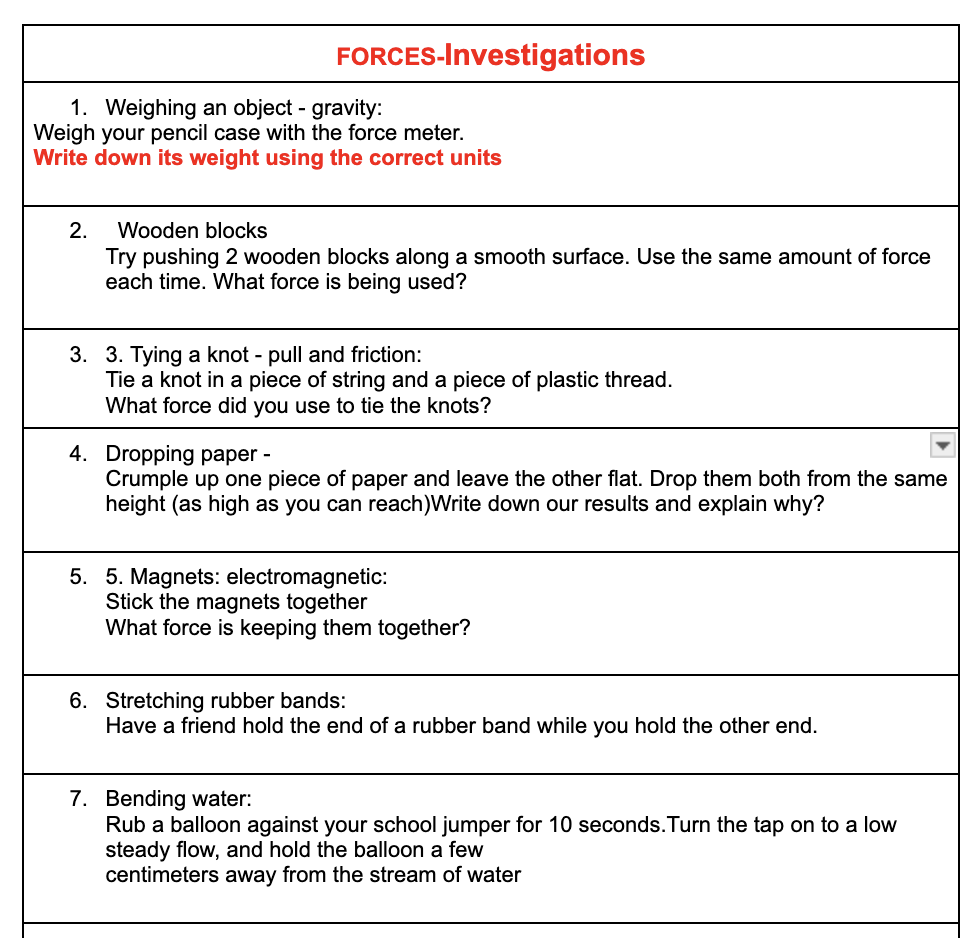
- We are EXPLORING...the context of 'choices and their impacts' by identifying the different types of forces and the effects created.
-
Kia Ora Welcome to Week 8...
PLAN & DO / WHAKAMAHI learning intentions:
- We are PLANNING.. to investigate the different types of forces and their effects.
Calculate force.
Differentiate between contact and non-contact forces.
Construct a line graph by using data collected.
Design a circuit and explain the forces in the brief.
Google Classroom - Link to Activities
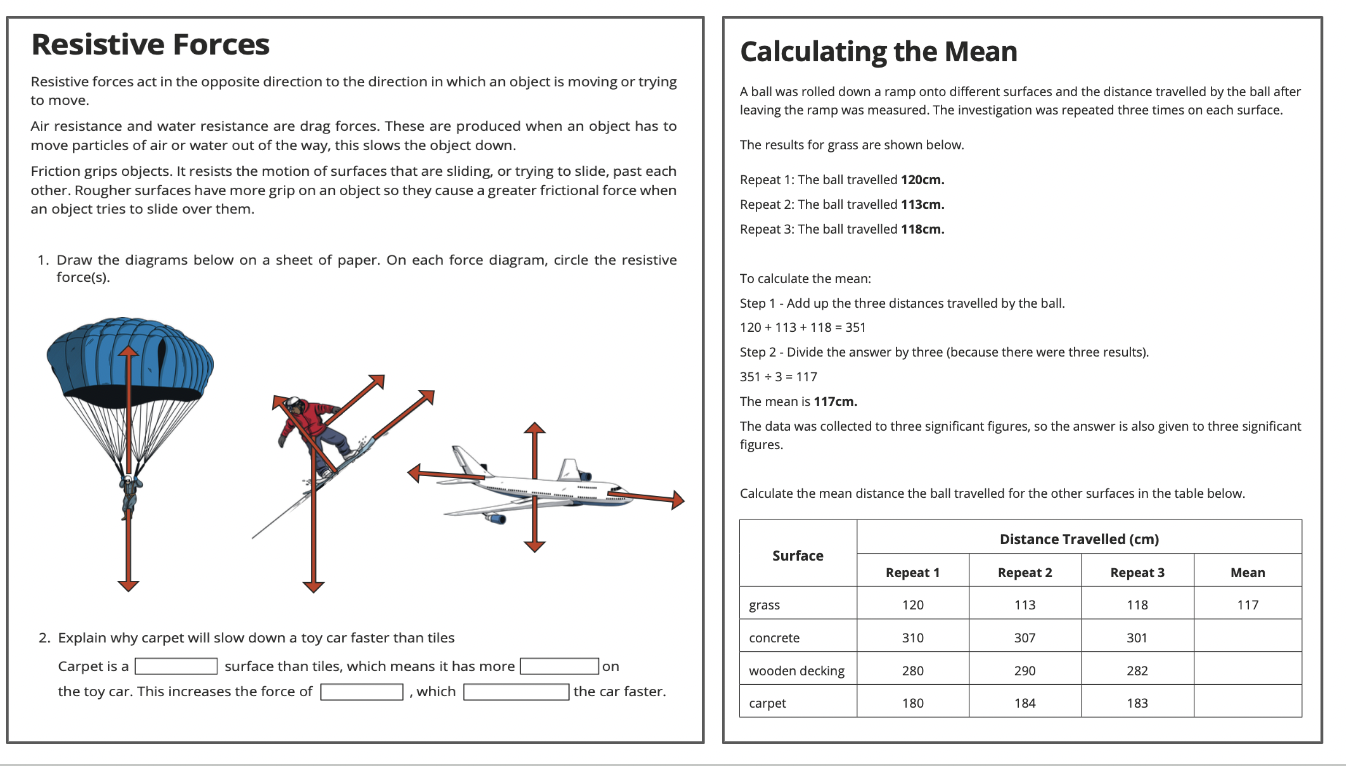
- We are PLANNING.. to investigate the different types of forces and their effects.
-
Kia Ora Welcome to Week 9...
PLAN & DO / WHAKAMAHI learning intentions:
- We are planning to adapt our knowledge of Forces on everyday real life situations.
Calculate force.
Differentiate between contact and non-contact forces.
Construct a line graph by using data collected.
Design a circuit and explain the forces in the brief.
Google Classroom - Link to Activities
- We are planning to adapt our knowledge of Forces on everyday real life situations.

